Article originally published in September in Echoes#8 – Struggles for Freedom of Movement
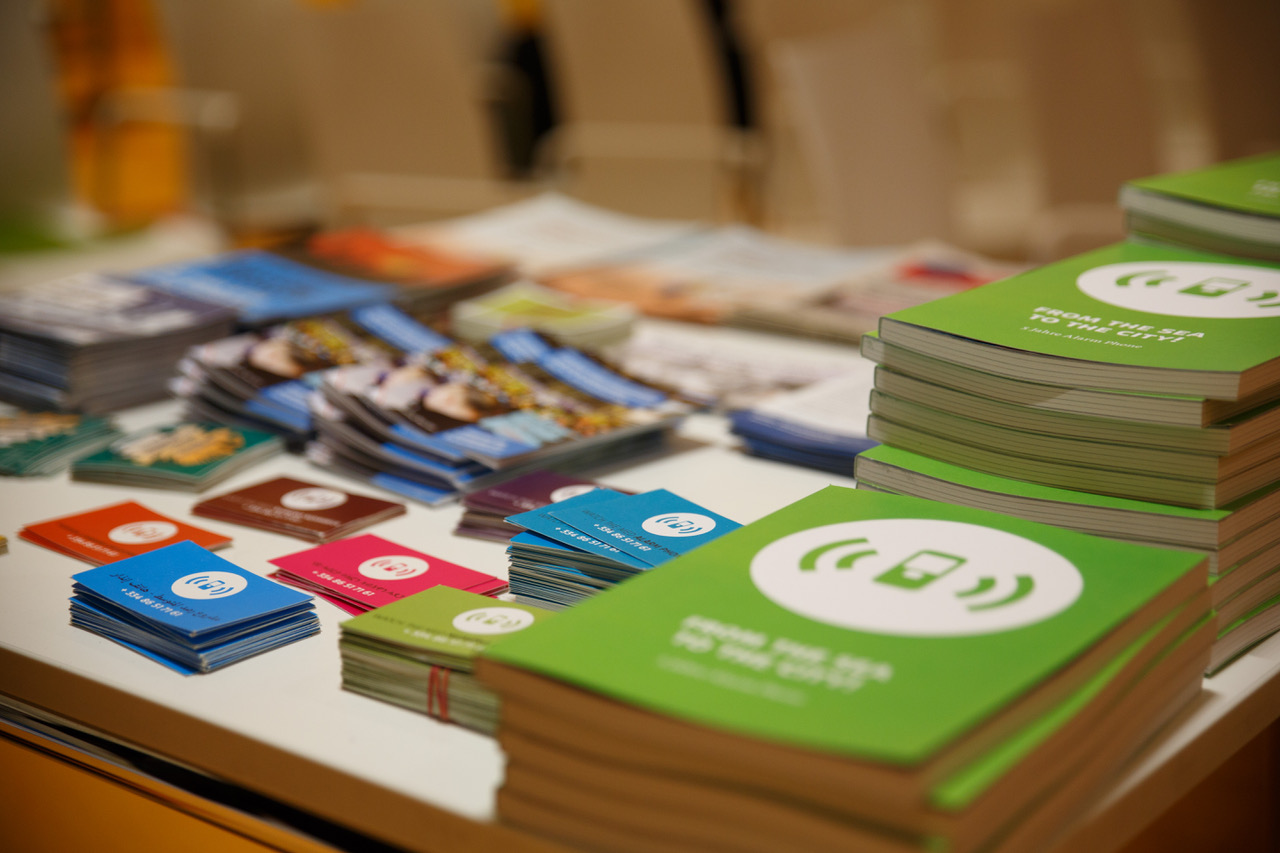
Source: Alarm Phone
Since October 2014, the WatchTheMed Alarm Phone (AP) has been operative 24/7 as a hotline that supports people in distress at sea. The AP activist network with around 300 members in many cities in Europe and North Africa, all of whom are volunteers, is mainly active on four migration routes: in the Aegean Sea between Turkey and Greece, in the Western Mediterranean between Morocco and Spain (including the Atlantic route to the Canary Islands), in the Channel between France and the UK, and in the Central Mediterranean between Libya, Tunisia, Malta and Italy. During the last nine years, AP has accompanied and supported about 7.000 boats along these different routes. In 2022 and 2023, the highest number of calls came from the Central Mediterranean region. The following interview will focus on experiences and challenges in this region, five activists from AP contributed to the answers.
Can you briefly describe how your AP shift work looks like in the Central Mediterranean, especially now in summer 2023 when so many boats departing from Tunisia and Libya?
Over the last years, the Central Mediterranean has once again become an incredibly busy route, with the number of people arriving in Italy increasing year after year since 2019. We have directly felt such an increase in our shifts. During good weather periods, we can be alerted to dozens of boats in distress per day and this is certainly an extremely challenging situation.
When boats call us after departing from Libya, we are often able to maintain contact as they have one satellite phone on board. In this way, we can receive key information from the boat, especially their GPS position, which we can then relay to state authorities and the civil fleet.
The situation is very different when it comes to boat departures from Tunisia. Here, the people do not have satellite phones and as the mobile phone coverage is only limited to places close to shore, we are often unable to reach the travelers for lengthy periods of time. We often try to match boats after they have arrived in Lampedusa but this is a difficult task, given that there were days during which over 40 boats landed on the island. We speak with many survivors after they reached Lampedusa safely. At the same time, we often find out only later that some boats have capsized and people have drowned. Many boats leaving Tunisia are incredibly dangerous metal boats that can sink within minutes.
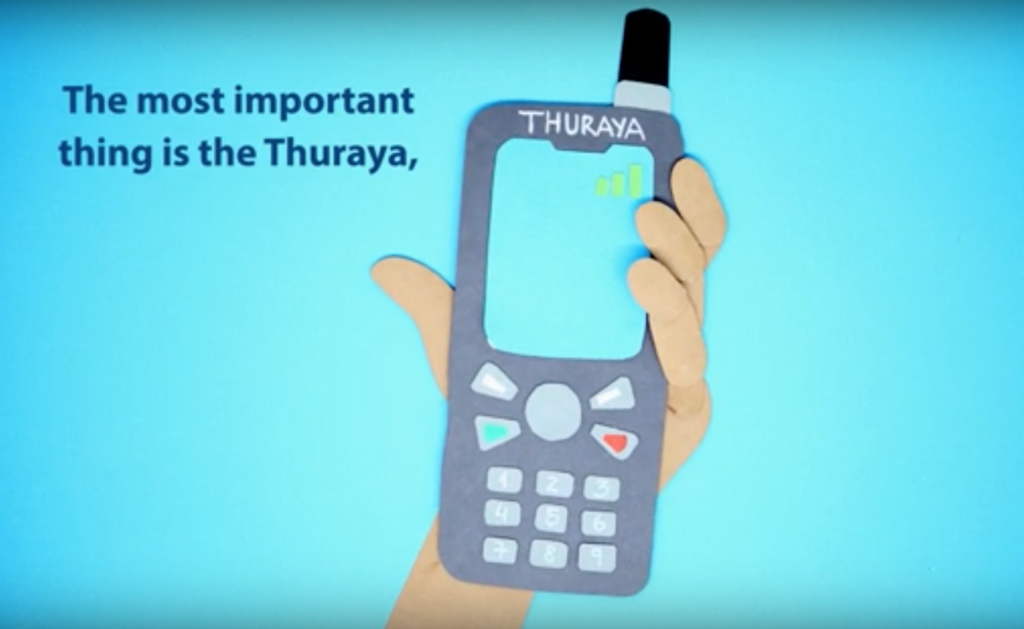
Source: Alarm Phone
Alarm Phone is an actor with a very decentralized structure with many shift teams working in different cities and countries. Can you describe your structure and concept in a few sentences?
The AP is an activist network that has local teams in a variety of places, both in Europe and Africa, and which thus had to create an infrastructure that allows us to work in a transversal and decentralized way. We often get media requests wondering about where our ‘headquarter’ is and people are surprised when they find out how we work. Maintaining a hotline day and night requires a flexible system. Calls from the sea are rerouted to our members who are ‘on shift’. Small ‘shift teams’ of at least two people speaking English and French are constantly available to respond to distress calls. We all follow our common alarm plans, which we drafted collectively as written standard procedures and which have been adapted and extended time and again, according to the developments and changes in the respective rescue zones.
We also have many members who are not doing phone shifts but who carry out incredibly central tasks, such as distributing the number to migrant communities in Morocco and informing them about the dangers of sea crossings. We also have innumerable working groups that are needed to carry out our work, ranging from technical support, translation, regional experts and research, media and documentation, cooperation with other actors, the search for missing people, and so on.
What are the differences in your work with boats coming from Tunisia and from Libya?
As mentioned above, the boats from Tunisia usually do not have satellite phones to communicate when at sea and thus we depend very much on information relayed to us by relatives and friends on land. The conditions for people on the move in Sfax or Zarzis are quickly changing and have deteriorated due to awful political developments over recent months. We saw all the raids and pogroms against Black people following the racist speech by Tunisia’s president Kais Saied in February 2023. People on the move are being deported into desert regions and brutal border controls escalated further after the Tunisian deal with the EU and Italy in July. As AP, we have members and good friends in Tunisia, who continuously document the situation, who try to scandalize the racist assaults, and who build practical solidarity structures in support of people forced into hiding as well as of the public protesters in front of the UNHCR and IOM offices.
From Libya, we have far fewer sources informing us from the ground but there are people who contact us after they have experienced interceptions and push backs. We also support Refugees in Libya, a self-organized refugee movement that carried out unprecedented sit-in-protests in Tripoli in 2021/22. Some members made it to Europe later and continue now to amplify the voices and demands of people on the move who are still imprisoned by Libyan militias or left abandoned in the streets by the UNHCR.
In October 2023, AP will turn nine years old. Can you highlight some main developments in your work in the Central Mediterranean over this time?
The idea for our hotline project emerged in response to the shipwreck from the 11th of October 2013, when Italian and Maltese Coastguards ignored the SOS calls from a boat and let 266 people die. We were inspired by Father Mussie Zerai, an Italian priest with an Eritrean background, whose private phone had turned into a hotline for refugees from East Africa – many years before we thought about AP. Over the first years of AP work in the Central Med, we only could build contacts to the boats by Father Zerai. He received many calls from boats in distress and would then forward these cases to the Italian Coastguards and to us. We would then take over the assistance of these boats and try to mobilize for their rescue. After the Italian-Libyan Memorandum of Understanding – implemented by the social democratic minister Minniti in 2017 – a new pull- and push back regime came into effect. Salvini became Italy’s interior minister in 2018, further trying to prevent sea crossings. Around that time, with the AP number spreading in Libya and elsewhere, more and more people on the move would contact us directly. At the latest since 2019, AP found itself increasingly in the role of a “rescue coordination center”, receiving many calls from boats and relatives on land, trying to push EU authorities to carry out rescue operations, and coordinating with the civil fleet to guarantee that people were not left to die.
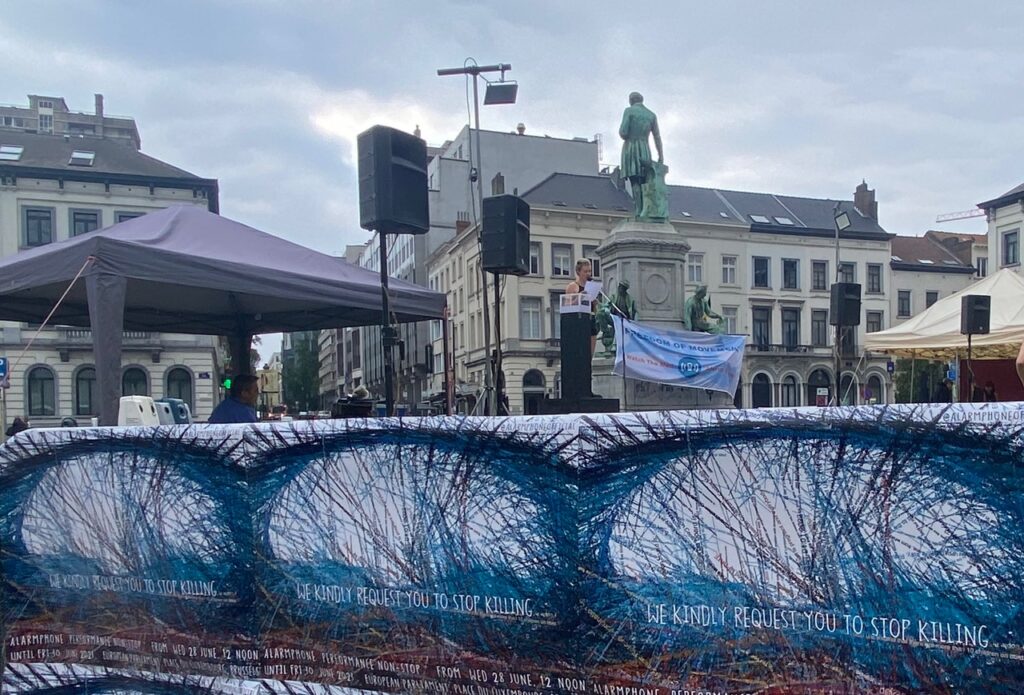
Alarm Phone Protest in Brussels in June 2023. Source: Alarm Phone
Being on duty 24/7 and responding to complex and ever-increasing distress situations sounds like a very stressful task. How do you manage this within your activist network?
Our work is indeed challenging and only possible to stem because we are so many in the network, some of us still active since we started the project in 2014. Our activism depends on knowledge and skill sharing and on the sharing of responsibilities horizontally among us. We need many shoulders to carry our work collectively. Regular face-to-face meetings twice-a-year are also key for us. We meet on both sides of the Mediterranean so that as many of us as possible can meet despite the harsh European visa regime. We need these meetings to exchange, discuss and learn about the developing situation in the Mediterranean. Over the last years, we also focused more on issues of exhaustion, trauma, and self-care. It is amazing to see what support structures we were able to build over the years and that we were able to grow with the challenges we faced. But we can only be creative as a broad network of solidarity that relies on information from people on the move and their relatives, who are based around the globe.
To be in direct contact with people in desperate situations at sea and to know that some of them later drowned must be a heavy burden. How do you deal with such experiences? Do you feel like a helpless (ear-)witness?
When European coastguards fail to react to boats in distress and the ships of the civil ships are not in the area, it is particularly difficult to assist people at risk of drowning. While trying to pressurize authorities to rescue, we remain in regular contact with the people on board to provide psychological support and offer hope. This often helps them to not feel alone and abandoned and we try to empower them in such traumatic situations.
Certainly, we are confronted with death at sea nearly every day. Relatives and survivors often contact us to report of shipwrecks and people going missing. And sometimes we are the last ones who hear the desperate voices before contact is lost and they disappear into the sea. Of course, AP members cope with such situations in different ways. Sometimes, affected persons take a break from shifts or even leave the network after traumatic experiences. We try to work as local and transnational teams so that nobody is left alone with such experience or the haunting question whether we as AP could have do more or something different to avoid such outcome. We also try to reflect and mourn collectively, for example by meeting online after shipwrecks occurred or lighting candles to remember the missing and dead. We also regularly hold commemorations, in which we grieve and protest the EU border regime for causing mass death at sea. Together with relatives and survivors, we engage in organizing CommemorActions and at times also take legal steps against state actors for their acts of non-assistance and left-to-die policies.
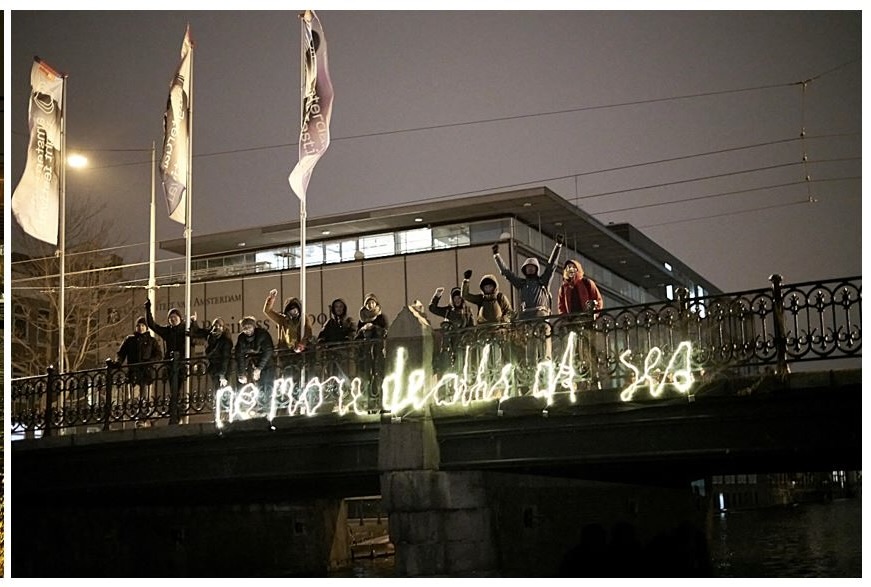
Action in Amsterdam in December 2022. Source: Alarm Phone
You mentioned the coordinating role of AP: how do you evaluate the collaboration process within the civil fleet during the last years? What is working well, what is still missing from your perspective?
As the official rescue coordination centers (RCC) of Italy and Malta have intensified their collaboration with Libyan militias and Tunisian authorities in order to prevent arrivals to Europe, civil actors are basically left alone with carrying out rescues, especially off the Libyan coasts. From our point of view, the collaboration between the many bigger and smaller NGOs with at times diverse political backgrounds and experiences has developed very well over the last years. The level of communication and coordination between the actors working at sea, in the skies, and on the phone is effective and often successful, even in our race against the push- and pull-back regime. Over the last months, we have noticed that more attention is being paid to the situation on land after boats arrive, thus showing a growing awareness of the often-difficult situations people face after reaching Europe and the importance of providing information about criminalization and asylum procedures in Italy.
The ships of the civil fleet are usually operative several days per rotation and often only for a few times per year. Additionally, some of them are blocked through Italy’s administrative measures and obstructed by the far port policy and the obligation to turn to port immediately after a rescue operation. The air assets (Seabird of Sea-Watch and Colibri of Pilotes Volontaires) are operational more regularly, but sometimes in maintenance. As AP is the only actor who is present in the Mediterranean all year long, we need to turn to merchant vessel and hope for their assistance when the civil fleet is absent. But merchant vessels are not reliable actors. Whether they respond to distress situations and bring the rescued to Europe or force them to Libya through ‘push backs by proxy’ depends on captains and companies.
On an operational level, where do you see the biggest challenges at the moment for people on the move and subsequently for you as an emergency hotline?
The push- and pull-back regime, which was established between EU member states, Libya and Tunisia, remains the main challenge in the Central Mediterranean. The use of Frontex airplanes and drones is key in this regime, trying to quickly orchestrate the interception of boats that were spotted from the sky. Also for us as AP it is very difficult to estimate the true extent of ‘successful’ push backs nowadays. In the SAR 3 region, the eastern region between Benghazi and Tobruk, we also face a new actor for several months now, a militia called Tareq Bin Zayed Brigade. They operate with a big and fast asset, probably closely-coordinated with Italian and Maltese authorities to organize interceptions even from far inside the Maltese SAR zone.
Also in view of the new EU-Tunisia deal we fear a further militarization and brutalization of Tunisian forces, aiming to stop the boats leaving from Sfax and other Tunisian cities. Combined with the criminalization of migration itself, particularly directed against boat drivers, the deterrence policies are worsening and directly responsible that the central Mediterranean passage remains one of the world’s deadliest migration routes.
In light of these developments, what do you fear, but also hope for, for the rest of this year and for 2024?
EU member states continue to negotiate agreements and deals with Tunisia and Libya to fight migration and we see the consequences very clearly: violent mass expulsions along the land-borders, including in the Sahara where there are almost no witnesses, brutal interceptions at sea, and so many deaths and disappearances. The rise of such border brutality is what we see already and fear that it will escalate further. The EU’s support of authoritarian regimes and dictators has a long history and tradition be it in Tunisia, Libya, Egypt or elsewhere – and there are no signs that this will change anytime soon. Europe’s borders become further externalized, forcing people on the move onto even deadlier routes. Also the situation within Europe is worsening, with deportations increasing and the asylum system becoming ever-more restrictive.
To take a more hopeful, or ‘possibilistic’ perspective: With more than 125.000 people arriving in Italy (until September 2023) via the Central Mediterranean, we might see a new record number of arrivals this year. That is remarkable as it occurs despite Italy’s ‘post-fascist’ government and the brutalization of EU deterrence policies. Who could have imagined such increase in arrivals in 2019, when only 11,471 people succeeded in crossing the sea to Italy? And who would have expected in summer 2022 that one year later, crossings from Tunisia would increase dramatically and ‘overrun’ the hotspot system in Lampedusa? Who would have thought that in August 2023, some people would make it from Sfax to Marseille in five days? Thousands continue to die and suffer, yes. That is the horrible reality, an unbearable crime, the consequence of a cruel deterrence strategy. But that migration stubbornly continues is also a reality. Once more, the autonomy of migration proves more creative and stronger than the EU border regime. We do not know the future, but we will continue to follow the tenacity of the struggles for freedom of movement and stand in solidarity with people on the move, day by day, along the different maritime routes.
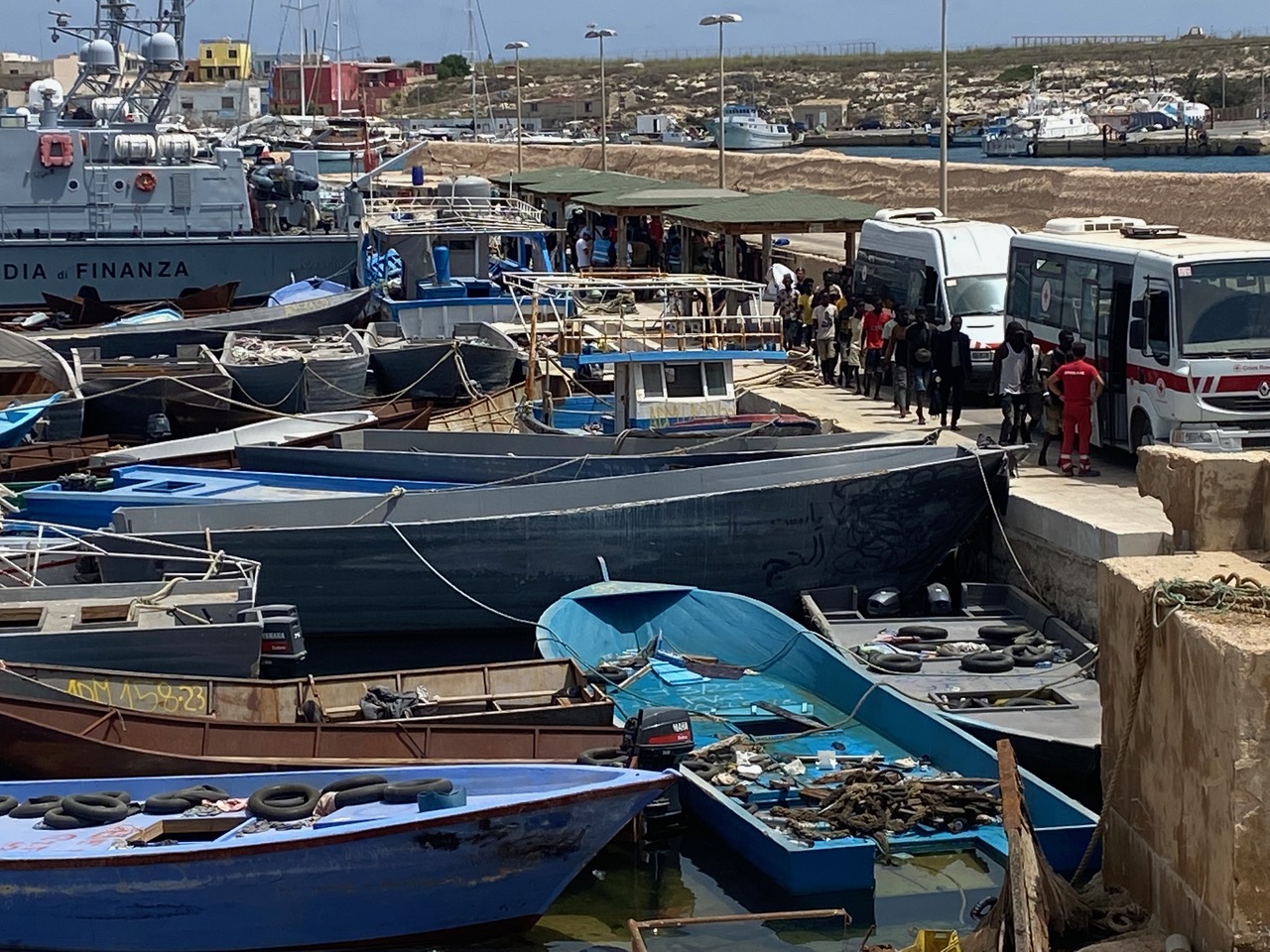
Lampedusa in July 2023. Source: Alarm Phone